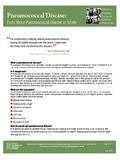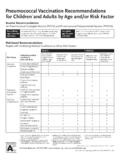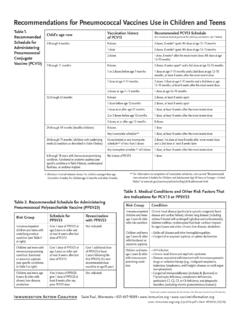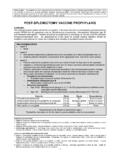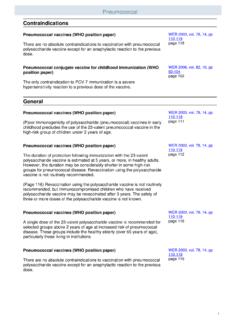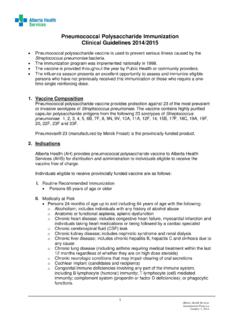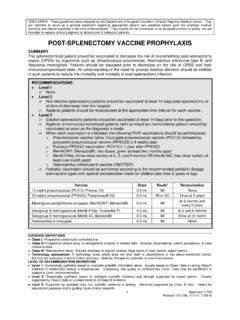Transcription of Saving Lives: Pneumococcal Disease: Integrating Vaccines ...
1 This initiative is supported by unrestricted educational grants from Merck & Co., Inc. and Pfizer Inc. NFID policies restrict funders from controlling program 2015page 1 of 2 Pneumococcal disease : Hard to say it; easy to get vaccinatedSaving Lives: IntegratingVaccines forAdults IntoRoutine Care Adult Pneumococcal Vaccination Guide for HCPsTwo types of Pneumococcal vaccine are recommended for use in US adults: a 13-valent Pneumococcal conjugate vaccine (PCV13) and a 23-valent Pneumococcal polysaccharide vaccine (PPSV23). Recommendations for their use vary by age and risk factors. Every adult age 65 years and older should receive both PCV13 and PPSV23. The table below will aid in determining which adults age 19 to 64 years need Pneumococcal vaccination. Details on sequence and timing of doses for adults in both age groups can be found on page 2 of this document.
2 Additional information and clinical guidance regarding the use of PCV13 and PPSV23 can be found at: CDC. Pneumococcal ACIP vaccine recommendations. Accessed November 24, for PCV13 and PPSV23 Administration for Adults Age 19 to 64 Years by Risk GroupSource: Centers for disease Control and Prevention (CDC)1 Risk GroupUnderlying Medical ConditionPCV13 PPSV23 RecommendedRecommendedRevaccination 5 years After First DoseImmunocompromised persons*Congenital or acquired immunodeficiency HIV Chronic renal failure Nephrotic syndrome Leukemia Lymphoma Hodgkin disease Generalized malignancy Iatrogenic immunosuppression** Solid organ transplant Multiple myeloma Persons with functional or anatomic asplenia*Sickle cell disease /other hemaglobinopathy Congenital or acquired asplenia Immunocompetent persons*Cerebrospinal fluid leak Cochlear implant Immunocompetent personsChronic heart disease Chronic lung disease Diabetes mellitus Alcoholism Chronic liver disease , cirrhosis Cigarette smoking * See Figure 1 for timing of these doses.
3 Includes B- (humoral) or T-lymphocyte deficiency, complement deficiencies (particularly C1, C2, C3, and C4 deficiencies), and phagocytic disorders (excluding chronic granulomatous disease ).** Diseases requiring treatment with immunosuppressive drugs, including long-term systemic corticosteroids and radiation therapy. Including congestive heart failure and cardiomyopathies, excluding hypertension. Including chronic obstructive pulmonary disease , emphysema, and disease : Hard to say it; easy to get vaccinatedAdditional Facts about Pneumococcal Vaccination Mild side effects include redness or pain at the injection site. In rare cases fever, muscle aches, or more severe injection site reactions may develop. Vaccination can be administered any time of year and one Pneumococcal vaccine can be given at the same time as influenza initiative is supported by unrestricted educational grants from Merck & Co.
4 , Inc. and Pfizer Inc. NFID policies restrict funders from controlling program 2015page 2 of 2 People age 19 to 64 years with chronic heart, lung or liver disease , diabetes, alcoholism, cirrhosis, or who are cigarette smokers need one dose of PPSV23. The charts below provide details on timing of PCV13 and PPSV23 doses for all others. 1 yearPersons who previously received PPSV23 at age 65 yearsPersons who previously received PPSV23 before age 65 years because they have a risk factorPneumococcal vaccine -n ive persons PCV13 at age 65 years PPSV23 at age 65 years PPSV23 PCV13 PPSV23 PCV13 at age 65 yearsPPSV23 at age 65 yearsFigure 2: PCV13 and PPSV23 timing for US adults age 65 years and older 1 year 1 year 1 year 5 yearsPneumococcal Vaccines given at intervals < 1 year do not need to be repeated.
5 Pneumococcal vaccine -na ve personsPCV13 PPSV23 8 weeks 5 yearsPersons previously vaccinated with PPSV23and PPSV23 at 65 years or later 1 year 8 weeks Figure 1: PCV13 and PPSV23 timing for US adults age 19 to 64 years with immunocompromising conditions, functional asplenia, CSF leaks, or cochlear implants* and PPSV23 at 65 years or later* See Table on page 1 for details on which adults age 19 to 64 years need Pneumococcal vaccination This dose not indicated for adults with CSF leaks or cochlear implantsPPSV23 PCV13 PPSV23 PPSV23 5 yearsNote: Medicare will reimburse for two Pneumococcal Vaccines as long as they are given at least 11 months apart.
